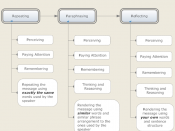Another important aspect of interpersonal effectiveness is communicating with others. Interpersonally effective people understand the importance of effective communications: it is not enough to know how to speak, read or write well. Interpersonal effectiveness also requires excellent active listening skills. In this lesson, we define communications, list the different ways people communicate, identify the differences between hearing and listening, and define and discuss effective listening. We will also differentiate between true listening and pretending to listen, list the many barriers to effective listening, and then discuss the process of active listening and present active listening techniques you can use to improve your listening skills.
How We CommunicateCommunication is the transfer of information among individuals. We share information with each other in four ways:1.speaking2.writing3.reading4.listeningAlthough we have been taught to speak, write, and read from an early age, we have received little, if any, training in listening.
Listening vs. HearingWhat is the difference between listening and hearing?æ½earing is automatic and passiveæÂÂistening is conscious and activeListening requires:æ¬ffort, attention, and concentration.
æ¦ proactive decision to listen, followed by internal and external behaviors that maximize your receiving an accurate message.
A great deal of our time is spent listening:�% of college students' time is spent in listening activities.
�% of employees' time in major corporations is spent in listening to others (Adler & Towne, 1993).
Communication requires two - a sender and a receiver - yet studies show that most people fail to listen well:æ³n average person retains one-half of what they hear after a 10 minute presentation.
æÂÂwo days later half the information is forgotten, meaning the average person retains one-fourth of what they heard (Atwater, 1986).
In a study of college age students:�% listened and 12% retained what professor said�% (both male & female) were thinking erotic thoughts�% were reminiscingæÂÂhe other 20% were:...


